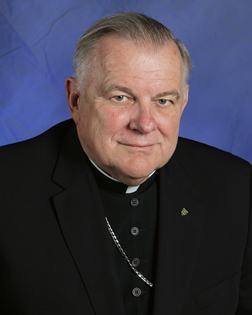
La fe de nuestros padres - �y nuestra?
Monday, October 11, 2010
*Archbishop Thomas Wenski
âLa Fe de nuestros padres, aún vive, a pesar del calabozo, el fuego y la espadaâ¦â Este himno, basado en Hebreos 11:1-2, todavÃa se canta en nuestras iglesias y es una alabanza a la supervivencia del Cristianismo a pesar de las persecuciones que han tratado de suprimirlo desde los tiempos de los emperadores romanos. La fe católica no se ahogó en la sangre de sus mártires, al contrario, más bien se hizo más fuerte tanto en intensidad como en su alcance. El estribillo de la canción: âFe de nuestros padres, sagrada fe, hasta la muerte te seré fielâ, en los labios de los santos, no fue un alarde vano.
Sin embargo, mientras todavÃa muchos se unen a cantar este estribillo, el compromiso con su fe católica es más vacilante. Muchos, moldeados por su experiencia en la sociedad de consumo en la que vivimos, son, como algunos los catalogan, âCatólicos de CafeterÃaâ â piensan que tienen la libertad de seleccionar y elegir aquellos dogmas de su fe que mantendrán y que de hecho van a practicar. Un reciente estudio Pew, que entrevistó a un sinnúmero de católicos sobre el conocimiento de su fe, encontró una pluralidad inquietante de âanalfabetismo religiosoâ; o sea, que no entienden, no comprenden o poco les preocupa entender lo que ellos, como católicos, se supone que crean.
Estudios Pew anteriores también han documentado el número de católicos que se ha alejado de la iglesia â algunos hacia sectas evangélicas y otros a una cómoda apostasÃa de una cultura más y más secularizada donde las creencias religiosas son motivo de indiferencia. De hecho, los católicos inactivos â aquellos a los que llamábamos âalejadosâ â si tuviesen hoy en dÃa su propia denominación, serÃa el grupo religioso más grande en los Estados Unidos. Sin embargo, ¿si en verdad entendieran lo que realmente creemos como católicos, hubiese dejado la iglesia la mayorÃa de estas personas?
Algo se puede culpar a las catequesis fallidas de dos generaciones de católicos que maduraron durante la confusión que acosó a la mayor parte de la iglesia luego del Segundo Concilio Vaticano. El programa didáctico de aprender el catecismo de memoria se reemplazó por uno más empÃrico. Los niños aprendieron que Jesús los amaba pero no podÃan nombrar los Diez Mandamientos ni los siete sacramentos.
Sin embargo, la intuición de los que propusieron esa âcatequesis empÃricaâ no necesariamente estaba del todo mal. El mismo Papa Benedicto XVI insiste en que el cristianismo no es primordialmente una creencia de una serie de proposiciones o ideas sino que nace de un encuentro con una persona: Jesucristo. Sin embargo, el encuentro con Cristo, si es auténtico, no puede ser sólo una creación de nuestra propia subjetividad: también necesita el âcontenido de la revelaciónâ que está en las Escrituras, las cuales nos da la iglesia, para poder conocer a Cristo como en realidad es.
En los 1990âs la iglesia produjo en el Catecismo de la Iglesia Católica, una sÃntesis de las enseñanzas del Vaticano II que era también una continuación de âla fe de nuestros Padres.â Este catecismo universal sirve como referencia tanto a los creyentes como a aquellos que buscan conocer a Jesús y lo que Ãste a su vez demanda de nosotros si aceptamos su invitación a entablar una amistad con El.
Nuestros padres mantuvieron la fe âa pesar de las persecuciones que sufrieron; nuestros padres nos transmitieron la fe â a veces sobreponiendo muchos obstáculos para hacerlo. Estudiar los cuatro âpilaresâ del Catecismo de la Iglesia Católica â el credo, los sacramentos, la vida de fe y la oración del creyente â ayudarÃa a los católicos de ahora a ofrecer, como dice el Apóstol, âuna explicación a cualquiera que le pregunte el motivo de su esperanzaâ¦â (1 Pedro 3:15)
Nuestros padres mantuvieron la fe â a pesar de las persecuciones que sufrieron; nuestros padres nos transmitieron la fe â sobreponiendo muchos obstáculos para hacerlo. Al ser más âreligiosamente instruidosâ podremos retener mejor nuestra fe y al mismo tiempo transmitirla a los demás.
âFe de nuestros padres,
Lucharemos por ganar todas las naciones para ti;
Y por medio de esa verdad que viene de Dios
Entonces seremos verdaderamente libres.â


Comments from readers
Confronted with that serious matter, some in our midst may say this is a consequence of the Vatican Council II. The problem is not what the Council said but what many of us think was said and changed by the Council. I still remember some of the problems caused by the Dutch Catechism of 1966, indicating that regarding the several methods of regulating births there was nothing said in concrete about this methods by the Council and consequently, they [the bishops] could "sense a clear development in the Church, a development, which is also going on outside the Church" (A New Catechism, 402). However, the Council in its constitution Gaudium et spes, clearly states that the members "of the Church may not undertake methods of birth control which are found blameworthy by the teaching authority of the Church in its unfolding of the divine law" (GS 50).
Unfortunately, this attitude toward not accepting the faith taught by the Church as a whole, is not limited just to sexual matters, we find it in many other areas such as social justice, capital punishment, war, euthanasia, liturgical practices, etc. As the Archbishop well indicates we have an excellent guide for our lives as Catholics in the Catechism of the Catholic Church; however, I would dare to add, that we need also to read again the documents of the Vatican Council II to understand and realize what was really said on the final documents prepared by the Council Fathers, approved by Pope Paul VI and wholeheartedly supported by all his successors.
I find very significant and providential that Archbishop Wenski signed this week contribution on Monday, October 11, 2010⦠the day we were celebrating the 48th anniversary of the opening of the Vatican Council II by Pope John XXIII.
It saddens me to see families define themselves in terms of their accomplishments, their neighborhoods, economic status and political affiliations. None of these things really give man a sense of who he is in relation to God and neighbor. All it says is what he has accomplished in comparison to others. Too often, Catholic's based their identity on achievements rather than the Christian ideal.
Tonight, after reading this article, I had a long conversation with a young man who asked me, "Brother, how do I fulfill God's will in my life?" I responded with something that I learned as a child. "Give him permission to take what he wants and welcome what he gives." Obedience and submission to Divine Providence was a key component in the faith of our fathers.
Thank you Excellency for helping me remember the most important lesson that my fathers handed down to me.
As a CCD teacher it saddens me to see our children having very little knowledge regarding the gifts of the Catholic Church and Her teachings. I believe this disservice to our children lies at the feet of all Catholics, religious and laity alike. Your words give me great hope the pervasive "Cafeteria Catholicism" can and will be reversed. God bless you!